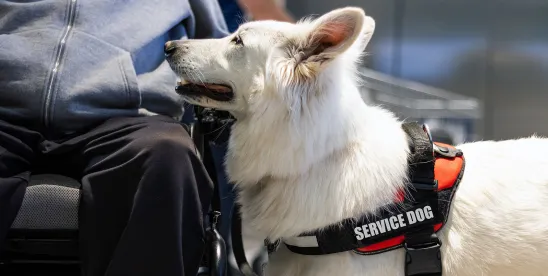A Maryland employer recently found itself in the Equal Employment Opportunity Commission’s (EEOC) doghouse when it allegedly summarily rejected an employee’s accommodation request to have his service animal come to work with him.
According to the EEOC’s press release concerning its recent lawsuit against the employer, the EEOC alleged that the employer, a car dealership, violated the Americans with Disabilities Act (ADA) by denying a disabled veteran’s request to bring a service dog to work to help manage his post-traumatic stress disorder (PTSD). The EEOC claimed the service animal was a medically necessary support to prevent debilitating panic attacks — a condition resulting from the employee’s combat service in Iraq.
Instead of engaging in the required interactive process to evaluate whether the request could be reasonably accommodated, the dealership summarily denied the request and offered no alternatives, according to the EEOC. The EEOC claims that lack of accommodation ultimately forced the employee to resign. Now, the company is facing a federal lawsuit seeking back pay, damages, and injunctive relief.
The case against the car dealership is a stark reminder that an employer’s obligations under the ADA may include permitting employees to bring their service animals – or even emotional support animals – to work with them as an accommodation for their disability(ies).
What the ADA Requires
The ADA prohibits discrimination based on disability in several areas, including employment. Title I of the ADA specifically requires covered employers (i.e., those with 15 or more employees) to provide reasonable accommodations to qualified individuals with disabilities. This applies both to applicants and current employees and includes the possibility of allowing service animals or emotional support animals as accommodations.
A service animal under the ADA is defined as an animal that is individually trained to do work or perform tasks for a person with a disability. These tasks must be directly related to the person’s disability, such as alerting them to a medical issue, retrieving items, or assisting with mobility. In contrast, emotional support animals (ESAs) — while they may offer therapeutic benefits — are not trained to perform specific tasks related to a disability.
Unlike in the public accommodation context under Title II (applicable to state and local governments) or Title III of the ADA (applicable to places of public accommodation), an employee’s request for an accommodation related to their emotional support animal is not unreasonable as a matter of law simply because it does not technically meet the definition of a “service animal.”
The Employer’s Role: The Interactive Process
When an employee requests an accommodation involving an animal, employers are required to engage in an interactive process — a collaborative dialogue to determine whether the request is reasonable and how it may be implemented. This process should be conducted in good faith and documented. If an employee requests that he be permitted to bring his service animal or emotional support animal to work with him as an accommodation for a medical issue, the employer’s obligation to engage in the interactive process under the ADA is triggered.
We see all too often employers get in trouble under the ADA because they summarily denied an accommodation request that they believed was not reasonable and/or would cause an undue hardship without any discussion with the employee who requested the accommodation.
When Can You Say No or Ask for More Information?
While the ADA encourages flexibility, employers are not required to allow animals in the workplace under every circumstance. If an employee requests to bring a service animal to work as an accommodation, and the employee is suffering from a non-obvious impairment, the employer is then permitted to request medical information from the employee to support the request for an accommodation.
The employer should also explore what accommodations may be effective to permit the employee to perform the essential functions of the employee’s position. A disabled employee is not entitled to their requested or preferred accommodation, only a reasonable one. That may involve working with the employee to find another accommodation that would be effective in accommodating the employee, rather than permitting the employee to bring their service or emotional support animal to work. If the EEOC’s allegations against the car dealership are accurate, then the car dealership should not have summarily rejected the employee’s service animal accommodation request but rather should have sought to work with the employee in the interactive process to find an accommodation that worked for both parties.
Lastly, employers are not legally required to provide an accommodation if it would pose an undue hardship on the employer, which is a difficult standard to meet, or if the accommodation would pose a direct threat to the health and safety of the employee or others. For example, although the case was not brought under the employment portion of the ADA, in November 2023, the Sixth Circuit Court of Appeals affirmed the grant of summary judgment to an employer who denied an employee’s request to bring her service animal to work because it caused a coworker and a patient to have allergic reactions and was therefore a direct threat to hospital safety.
What About My Place of Public Accommodation?
Employers operating places of public accommodation should also be familiar with their legal requirements under Title III of the ADA. Title III of the ADA, applicable to places of public accommodation, requires service animals (i.e., not emotional support animals) to be allowed in all areas of public access, unless (1) granting access would fundamentally alter the nature of the program; (2) the animal poses a direct threat to the health and safety of others; (3) the animal is out of control; or (4) the animal is not housebroken.
When it is not obvious what service an animal provides, only limited inquiries are permitted. Staff at places of public accommodation may ask only two questions: (1) Is the service animal required because of a disability, and (2) what work or task has the service animal been trained to perform?
On the other hand, staff at places of public accommodation cannot (1) ask a visitor what his or her disability is; (2) ask whether the person can demonstrate whether the service animal can perform the work or task; (3) require medical documentation; or (4) require a special identification card or training documentation for the service animal.
Although employees’ or visitors’ requests to bring a service or emotional support animal to your place of employment can be challenging, engaging in the required interactive process and knowing your legal requirements can help keep your workplace from going to the dogs, at least from a legal perspective.





 />i
/>i
